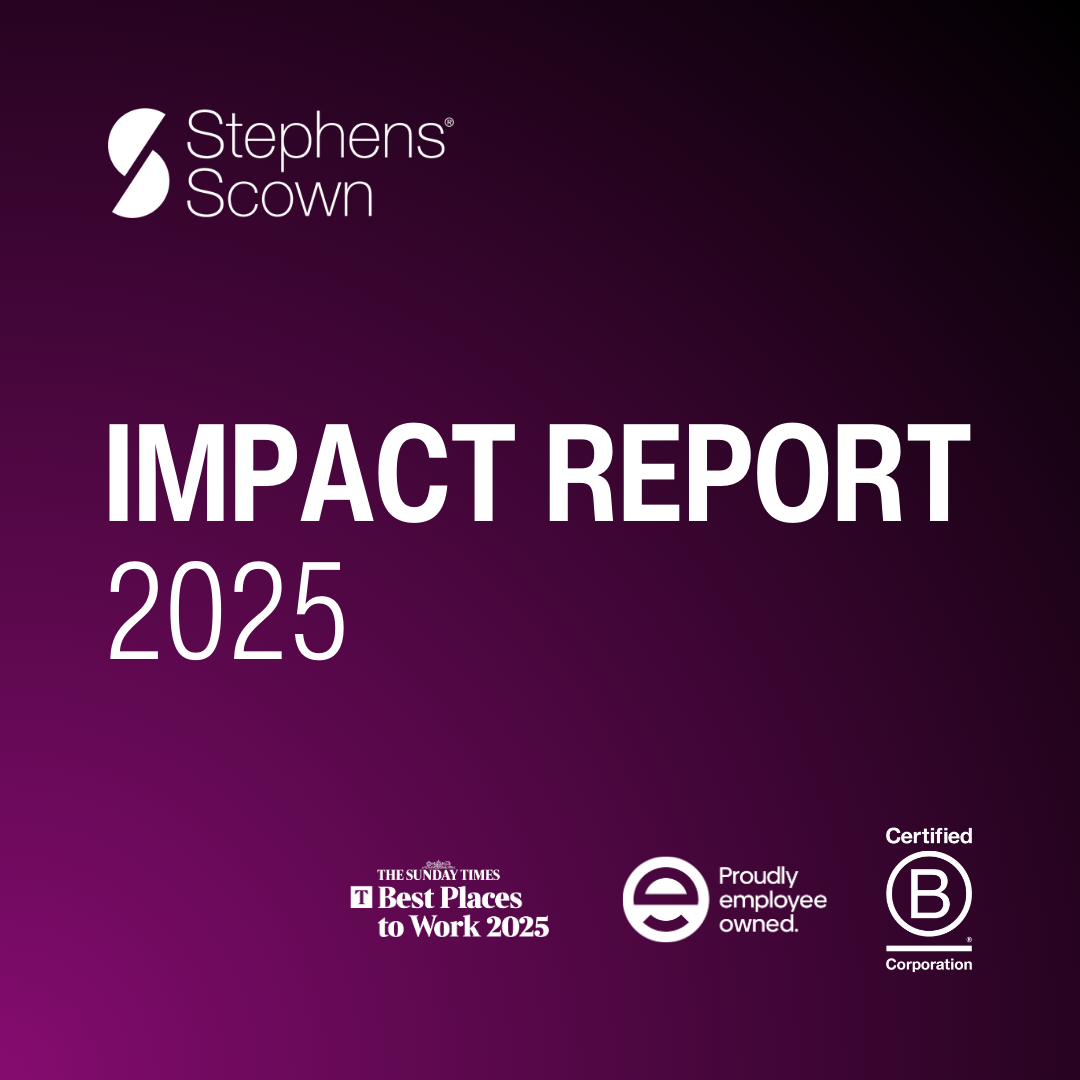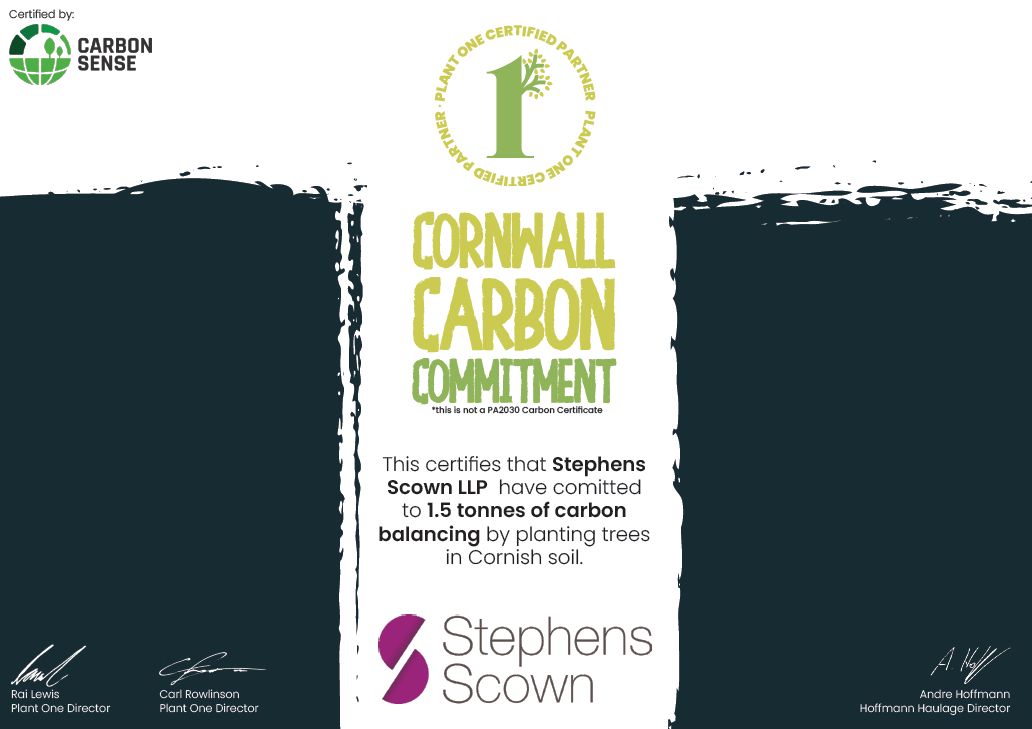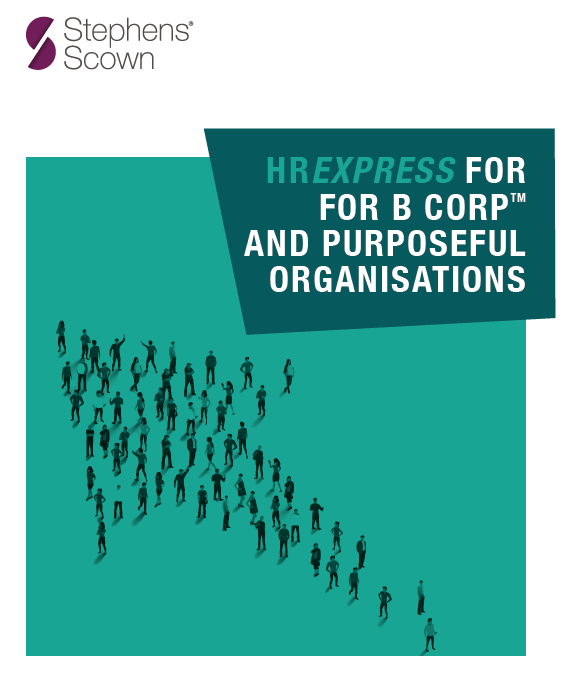Sustainability - building your purpose and impact
Increasingly, organisations and business leaders are no longer measuring success solely from the annual accounts, but whether it has a defined positive purpose, whether that purpose is being met and what the organisation’s impact is. That impact might be environmental, related to the community around it, its people, supply chain and the wider effects on the other business and customer relationships it holds.
There is a positive global movement towards business being a force for good, led by the B Corp™ community, of which we are delighted to be a member. This seeks to encourage organisations to strive for high standards of social and environmental performance, accountability and transparency. It engages businesses in balancing profit with purpose.
There are many positive reasons to do this – including financial. Research has shown that businesses with a shared sense of purpose will be more successful in transformation and grow more vigorously than their peers.
As the first large law firm in the UK to become employee-owned and having become B Corp™ Certified in December 2022, we have focused on building a dynamic and innovative business dedicated to delivering for our clients and providing a rewarding and supportive workplace.
Having walked this path ourselves (and still learning and improving), we understand that this is not easy and there is no ‘one size fits all’: every organisation will have different opportunities and priorities in this regard.
We recognise also that increasingly individuals want to know how the decisions they make in their personal lives impact on sustainability.
Our lawyers are knowledgeable and passionate about helping you build your own purpose and positive impact, at whatever stage of this you are at.
Here are some practical ways we can support your organisation with its purpose and impact:
Protecting your ethos and values on Sale or Investment
Alongside supporting businesses’ transition to employee ownership, we’ve helped businesses successfully attract investment or a trade sale. As well as demonstrating sustainable revenue growth, it is increasingly critical for businesses to focus on the nurturing of its values and ethos to build a strong team and identify the essential skills needed for growth. This is because it is recognised that these are the key drivers to delivering a positive impact on company culture, growth, resilience, and ultimately commercial success.
Investors are looking to acquire businesses that are striving to be more sustainable and reduce their impact. As part of this movement, we have seen investors taking a keen interest in environmental, social and governance with many now appreciating that these factors are a key element of value creation following shifts in the global investment market. As a result, this once peripheral consideration is becoming an investment criterion in M&A transactions, refinancing and investment rounds, which now have a clearer focus on the importance of demonstrating sustainable value creation.
Having a clear mission and building a portfolio of supporting data is key for such businesses, as the due diligence process is evolving to consider a wider set of legal considerations and reputational risks. We help businesses prepare for that process by working through the key themes to ensure businesses have a clear understanding of funder or buyer expectations and any likely risks, concerns and requirements. As part of that process, we also work with businesses who are looking to protect their ethos and values including safeguarding particular social or environmental standards or initiatives that are core to the business as part of the investment or exit during negotiations.
B Corp™ Certification
B Corp™ Certification is a commitment to consider impact for the long-term by building it into the very fabric of their business. B Corps™ are reassessed every three years, and at each assessment, the criteria becomes more ambitious as B Corps™ are encouraged to continuously develop their business and increase their positive impact.
We believe there is a huge potential for businesses in the South West to become B Corp™ Certified. We would be happy to discuss the benefits with anyone wanting to start their B Corp™ journey or those in the latter stages of trying to get their B Corp™ Certification across the line.
We have actively supported two cohorts of Cornish businesses in applying for B Corp™ accreditation in 2023 via the B23 initiative.
All B Corps are required to change their legal constitution to reflect balancing people, planet and profit. We work with boards and leadership teams to help explain what this means as well as making the required legal changes.
It is also an important part of the certification to ensure that your organisation is meeting its social and regulatory requirements. Applicants must declare any disputes over the last five years as well as any data protection issues. We partner with B Corp businesses and those that are aspiring B Corps to ensure they are meeting these requirements and to manage any concerns arising. Find out more about how our specialist Intellectual Property and Data Protection team provides help to all kinds of businesses with their data security, read more here.
Employee Ownership
Employee ownership is rapidly becoming one of the most important developments in business ownership, and an increasingly attractive option for many organisations. Employee-owned businesses are increasingly seen as a model that can reduce inequality and help tackle climate change, as the framework is built on enhanced corporate purpose and therefore contribute to a fairer, more productive and resilient future economy, making a positive contribution to society and the environment as a whole.
Opportunities for greater employee engagement, surges in profitability and enhanced staff retention have piqued the interest of the media and, in turn, the owners and founders of businesses across the UK. For owners considering an exit or succession plan, employee ownership offers a tax incentivised exit with less stress and to a timescale of the owners’ choosing. As a growth strategy it can also offer real purpose for the employees and a true sense of shared benefit.
As an employee-owned business we have learnt a few lessons of our own but we have also supported over 40 companies exploring and commencing EO projects alongside building national connections with long-established EO businesses and thought leaders in this area.
We help to navigate the technical aspects of the process, but perhaps more importantly, we understand the importance of retaining the core principles and underlying values of the business, which drive the founders who choose employee ownership above all other succession options. We believe that EO has an important part to play in the future shape of business and it’s our intention to provide the best support to companies taking that . If you would like to know more about how employee ownership could be right for your business or support succession planning, including a link to download our guide to employee ownership you can find more information here.
Employee Engagement
The power of team in sustainability is vital: not only to help your organisation have the internal resource to really ‘walk the talk’, but also to ensure this is truly embedded in your organisation’s culture.
From our own experiences in engaging our colleagues through Employee Ownership and B Corp™, we have supported many organisations with practical support around getting and keeping strong employee engagement.
This has included: designing and embedding colleague involvement into eco and giving back programmes, making this part of your KPI’s bonus schemes, appraisal and promotion documents, delivering management training for leaders, implementation and embedding Green Travel Policies, speaking at your away days about our experiences to inspire and engage colleagues with a sustainability journey, what it means to them and how that might look in their own business.
Read more about how to engage your team around sustainability and ways to build employee engagement.
Ethical HR
Our Employment and Immigration team is renowned for its approach to ethical HR people management. This approach ensures that you are not only complying with the required standards to not infringe employment law but are also looking for the best ways to maintain your culture and values while doing so.
It is being alive to the ripple effect and open to new ways of balancing what the organisation needs, with what works for your people. It can sometimes mean tackling hard situations in different ways, while still being prepared to have challenging conversations or resolve issues when they arise.
If you would like inspiration on how to get a happy and engaged workforce, you can read more here, this also details what ethical HR is and what’s in it for employers.
Examples of work the team have done include:
- Implementing hybrid and flexible working policies that work for both parties.
- Approaching restructure or redundancy processes with a people-centred approach.
- Managing strong feelings on moral issues within a charity team, in a way that kept the team working together and avoiding a costly dispute.
- Ensuring fair and supportive treatment of those coming from overseas to work in the UK under sponsor licenses.
Equality, Diversity and Inclusion
Most organisations have policies to avoid discrimination, victimisation and harassment. Many have training to seek to ensure colleagues act appropriately in the workplace. Our Employment Team support organisations with both of these mandatory requirements, as well as:
- Reviewing and formulating bespoke EDI programmes.
- Advising on potential EDI risks arising in new policies, practices and procedures in organisations.
- Investigating allegations of discrimination and guiding on how to manage disputes and Employment Tribunal cases on the Equality Act.
- Supporting on trickier aspects that arise, where there are competing views or interests.
Protecting and maximising new Green Technology
Our Intellectual Property and Data Protection team are increasingly working with businesses that value balancing planet and profit, including those that have achieved B Corp™ status. They help purposeful businesses protect their intellectual property and implement the necessary policies and contractual terms. They work with businesses bringing new technology into existence that focus on sustainability and addressing the climate crisis as well as businesses prioritising innovation to improve health and wellbeing.
Impact of your Land and Property
It is widely reported that the built environment is responsible for around 40% of global carbon emissions, partly from the construction process – including materials, transportation, demolition and replacement – and partly from property operations – heating, lighting, cooling and so on.
There is increasing regulation imposing mandatory obligations on property owners and developers to manage and reduce their environmental impact, and an overarching push towards being more mindful of the planet. We can support you in understanding your legal obligations and in adopting appropriate provisions in your documentation, having regard to your own ESG strategies and being mindful of the reality of cost implications.
In collaboration with specialist search providers, our lawyers will also flag the potential for physical climate risks and how they may impact on your real estate investment.
Planning, Development, Green Construction and Retrofitting
Our Construction team advise developers and contractors in respect of sustainable building methods such as Passive House or the use of low carbon materials. We encourage clients to consider the environmental impact of the work at an early stage and to ensure that they include provisions in their contracts to ensure that sustainability demands are met. We also work closely with project managers to ensure that what is built is in accordance with the high specification and environment standards required.
Our Development and Planning teams also work closely with our clients and their consultants to ensure that they are aware of issues such bio-diversity net gain, environmental protection and carbon net zero – from legal compliance to competitive, strategic advantage.
We partner with renewable aggregates organisations and those exploring greener construction materials.
Energy Performance and Green Leases
The introduction of the Minimum Energy Efficiency Regulations, which require a landlord to ensure that a property meets the minimum rating both at the start and throughout a lease term, has resulted in greater focus on “green” lease terms that represent a commitment between the parties to minimise environmental impact.
Our Real Estate team can assist with developing provisions that are best suited to your particular circumstances, aligned with your own strategies and having regard to practicalities. Such clauses can look to preserve the high standard of buildings that have been designed with energy efficiency in mind or cover obligations that contribute to small improvements in existing premises and encompass a host of sustainability matters beyond energy efficiency alone.
For example, we’ve advised on clauses which require the parties to co-operate in sharing data and good practice, terms covering waste management strategies and dilapidations provisions that take a more sustainable circular approach where certain tenant alterations may be left in situ at the end of the term so that they can be used by a subsequent occupier, thereby reducing waste.
Solar and Wind Farms
Our specialist Energy team have a long history of helping private landowners put renewable energy solutions onto their land. This involves specialist contracts and negotiation and consideration of best protecting the land used while maximising the renewable energy potential. We also advise on battery storage projects and EV charger deployment and development of brownfield sites.
Read more about how redeveloping brownfield land for green power could help the UK hit its net zero target.
Sustainable Housing
Sustainable housing schemes, which are designed and developed by the communities that live in them, are increasingly popular across the UK. They provide a brighter, greener approach to meeting Britain’s housing needs.
Whether your scheme is co-housing, self-build, community land trust, affordable house or eco trust, we can help guide your project to a successful conclusion.
We also have longstanding partnerships with numerous social housing organisations, working with them to review how they could modernise their lease terms to incorporate more environmental and social aspects.
Read more about our work in support of sustainable housing schemes.
Protecting Woodlands and Rural habitats
Having your own piece of woodland for personal amenity use is a great way of helping biodiversity and protecting trees. Our Woodlands team help transfer the ownership of smaller parcels of woodland from bigger landowners to private individuals for amenity use, placing restrictions on the land to prevent development including use of the woodland as commercial campsites.
Our Rural team is increasingly working with clients interested in protecting the natural habitat. We advise on the evolving opportunities for carbon offsetting and biodiversity net gain contracts and around sustainable diversification working closely with clients and their other rural advisors.
We support wildlife trusts helping preserve their land assets and protect them going forward.
Find out more about conservation covenants.
Waste Management and Environmental Permits
Our Regulatory team supports clients to meet their regulatory duties, working closely alongside the Environment Agency, Health and Safety Executive and the Department for Environment Food & Rural Affairs to avoid and minimise damage to people and planet.
With nearly 20 years’ experience in providing compliance and enforcement advice, Steve Panton, who leads the firm’s Regulatory team, is a member of the Health and Safety Lawyers’ Association and UK Environmental Law Association.
What about for private individuals?
Here are some practical ways we can also support private individuals with their purpose and impact:
- Sustainable finance and investment.
- Residual legacies in wills to charities or communities.
- Setting up trusts for families to reflect their specific values and aims.
- Ensuring conflicts are dealt with proportionately. Our family teams all follow the Resolution Code of practice, which involves us acting in a constructive and non-confrontational way so that we do not worsen family disputes and are mindful of relationships between parents in separated families and the need to put children first in decision-making.
Contact us to explore new ways to become a more purposeful business, embedding sustainability into the heart of your business and attracting new clients and customers who want to buy into a more sustainable future.
How can we help you
"*" indicates required fields
By pressing send and providing your details you are agreeing to our Privacy Notice.
Once you submit your enquiry we will forward to the correct legal team to get in touch as soon as possible.
Related Services
- Real Estate
- Data Protection
- Regulatory
- Corporate and Commercial
- Dispute Resolution (Business)
- Business Immigration
- Employment
- Technology
- Intellectual Property and Data Protection
- Specialist Sectors
- Intellectual Property













